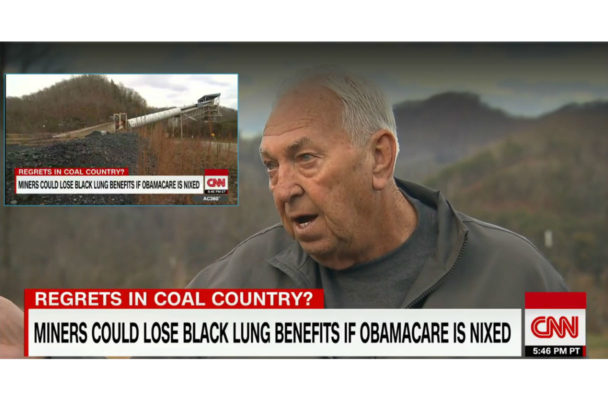Byrd Amendments Update: House Republicans from Coalfield Districts Introduce Resolution to Protect Black Lung Improvements from Obamacare Repeal

Lately the black lung provisions that are within the Affordable Care Act—called the “Byrd Amendments”—have (rightly) been getting a lot of media attention. For example, there’s been coverage by CNN, the Washington Post, the New York Times, Stat News (which was picked up by the Boston Globe and The Week), and many others.
(Although not directly discussing the black lung provisions, I recommend a piece by Jeff Stein that ran on Vox that explains why coalfield voters would simultaneously vote for Trump and expect that important programs for coal miners be protected.)
There’s also starting to be coverage of efforts by black lung associations and others to protect the black lung improvements. For example, a local CBS-affiliate in Eastern Kentucky, WYMT ran a story that covered a meeting of the Southeast Kentucky Black Lung Association, which is circulating petitions to protect the black lung improvements. (An online version of the petition is available here.)
Even for we who are following this issue closely, it is difficult to predict what is actually going to happen to the parts of the Affordable Care Act that improved the black lung benefits system (to get technical § 1556 of the ACA).
Will they be exempted from a general repeal of Obamacare? Will they be part of an overall repeal but introduced as a part of a Republican replacement for Obamacare? Or will it get particularly confusing, and a general repeal will get filibustered by Senate Democrats who invoke the Byrd Rule to save the Byrd Amendments during budget reconciliation?
It’s all up in the air, and there are a number of directions this could go.
Today, brought one minor development that could grow into something more interesting. A group of House Republicans representing coalfield districts introduced a House Resolution in support of preserving the Byrd Amendments.
In specific, Representatives Evan Jenkins (R-W. Va.), Morgan Griffith (R-Va.), David McKinley (R-W.Va.), Alex Mooney (R-W.Va.), and Hal Rogers (R-Ky.), introduced H. Res. 26. The text of the resolution is available here, as a part of a press release put out by Rep. Jenkins.
It appears similar to a bill that has been introduced in previous years by Rep. Morgan Griffith (e.g., H.R. 130 from last year) that essentially would make the Byrd Amendments part of the law in a way that was separate from the Affordable Care Act. This would mean that if the Affordable Care Act is repealed, the black lung improvements would not be lost. (Note that Morgan Griffith has introduced a bill this year at H.R. 323, but the text of the bill has not been made available.)
I don’t mind admitting that I know very little about House procedure and what effect, if any, a House Resolution (even if passed) might have on the future of the Byrd Amendments.
But it does appear to signal that even on the House side, and even among Republicans, there is interest in preserving the black lung improvements that are contained in the Affordable Care Act.
Considering the sharp resurgence in black lung, there should be a way to turn this interest into concrete action.
4 Responses to “Byrd Amendments Update: House Republicans from Coalfield Districts Introduce Resolution to Protect Black Lung Improvements from Obamacare Repeal”
wish a judge could walk one day in my husbands shoes. being denied a second time, has left us devistated, dont know where to go from here,God bless anyone who can help a coal minor and his family who are in distress’ sylvia mihalic
congress needs to leave Byrd Amendment as is and keep these widows and miners which was promised from cradle to grave! And the rural cllinics how this will hurt our poor people.
Thanks Evan for the useful information. The Griffith bill looks very much like the one Cong. Rahall introduced year after year.
I would expect the senators from coal states to also support keeping the Byrd Amendments, but I fear carriers who have a lot of liability on the books and potential liability, to come with the money to Congress.
Comments are closed.